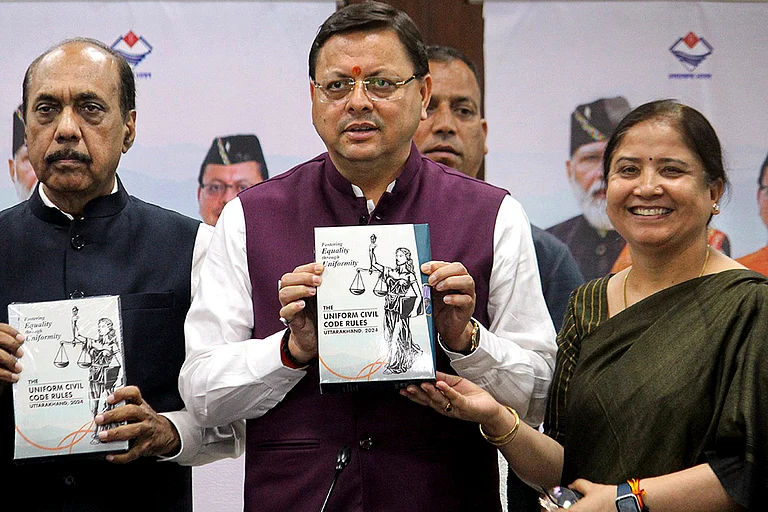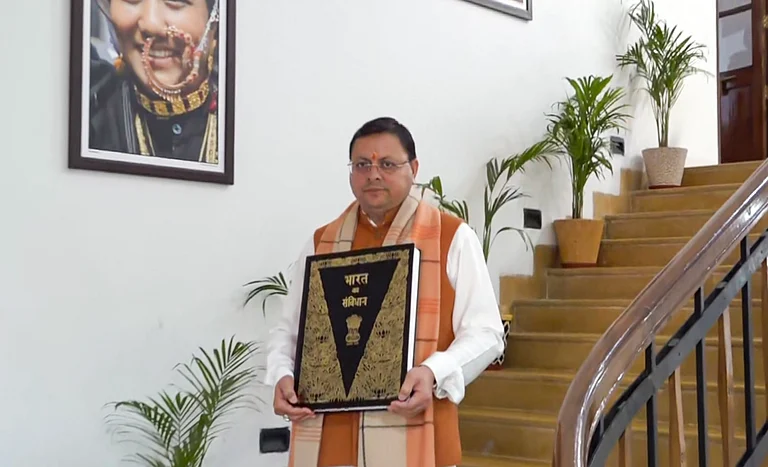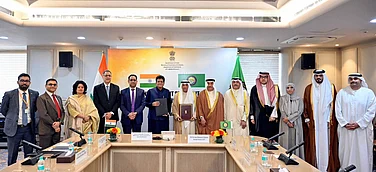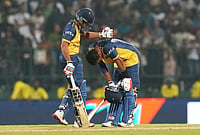Rahmath Razakh (name changed), a school teacher in Palakkad, Kerala, has been waiting for the approval from her paternal uncles to sell her ancestral property to clear off her debts. She is the youngest of the three daughters of her father, who passed away in 2015. Since his demise, the daughters have been left at the mercy of their paternal uncles because the law does not grant complete entitlement to daughters over their father’s property. According to Muslim personal law, if a deceased man is left only with daughters and no sons, a share of his property goes to the paternal uncles and aunts. However, Razakh, who does not wish to go to the courts, has been trying to negotiate with them to arrive at an amicable settlement.
Despite being aggrieved by the personal law, which is discriminatory in nature, Rahmath is not enthusiastic about the idea of a Uniform Civil Code (UCC). “I am scared and confused about the idea of a UCC,” says Razakh. “Why do they want to impose a uniform code upon everyone? I don’t think a party like the BJP would stand for gender justice,” she says.
Razakh is one among many women who share the same apprehensions about the UCC. The feminist interventions in the debates around UCC since the late 1980s clearly reflect the scepticism expressed by Razakh—an ordinary school teacher who is unable to articulate her confusions, but is unwilling to accept the UCC as a resolution to her problems.
The Indian women’s movement has a long history of engagement with the idea of UCC. According to an eminent scholar, it traces back to 1937, the year in which the All India Women’s Conference raised the demand for a UCC for all religious communities. This demand continued to be made by large sections of the women’s movement till the late 1980s. By the early 1990s, however, there was considerable rethinking on the issue. The Shah Bano case and the demolition of Babri Masjid were two important moments that caused a paradigm shift in the feminist discourse on the UCC.
During the latter half of the 1990s, the women’s movement experienced notable transformations as it embraced a range of perspectives, which even entailed a complete rejection of the UCC. a consensus emerged regarding a strategic approach to advocate for gender-equitable legislation.
The feminist movements and scholars, who were broadly in agreement with a common civil code irrespective of religion, made a significant change in their position realising that the call for UCC was becoming a powerful tool for the right wing Hindutva to strengthen their political agenda. According to the Hyderabad-based Anveshi Research Centre for Women’s Studies (ARCWS), “The Shah Bano case, which addressed the question of maintenance for a divorced Muslim woman, had become the rallying point for Hindu groups.”
The All India Democratic Women’s Association (AIDWA)—the women’s wing of the CPI(M) that initially supported the call for UCC—changed its position after a series of debates with feminist scholars and movements in the wake of the Shah Bano case and the 1995 Sarla Mudgal case. In the Sarla Mudgal case, where four Hindu women filed a case against their husbands for bigamy by ‘fraudulent conversion to Islam’, the Supreme Court pressed the need for a UCC. This case also was a critical moment of departure for the Indian feminist movements and scholars from their demand for a UCC, as this judgment was one strengthening the Hindutva idea of a UCC. “The Sarla Mudgal case is an example of how misplaced judicial zeal uninformed by scholarship ended up as Hindutva’s UCC stick to browbeat the minorities,” says Jhuma Sen, a lawyer, academic and feminist scholar.
During the latter half of the 1990s, the women’s movement experienced notable transformations as it embraced a range of perspectives, which even entailed a complete rejection of the UCC. During this period, a consensus emerged regarding a strategic approach to advocate for gender-equitable legislation across three distinct levels. Firstly, the movement prioritised the reformation of personal laws to ensure fairness and equality. Secondly, dedicated efforts were made to enact laws that addressed issues not covered by existing secular or personal legal frameworks. Lastly, there was a collective recognition of the imperative to establish a comprehensive and inclusive gender-just framework that extended its reach beyond personal spheres, encompassing public domains as well.
However, women’s movements have been largely confined to their position that what the country needs is not a UCC, but reforms within the personal laws. “The CPI (M) believes in the basic principle of equality between all citizens, and between men and women. In the given circumstances, the goal of equality can be, at best, realised through the route of reform in all personal laws—precisely the way forward suggested by the Law Commission report in 2018,” says Brinda Karat, the former general secretary of AIDWA and the Polit Bureau member of the CPI(M). She alleges that the Modi Government is going ahead with the idea of UCC even at the cost of ignoring the Law Commission recommendations. “The 21st Law Commission, appointed by the Modi government with an express mandate to provide recommendations for UCC, categorically stated, in its 2018 report, that a UCC is neither necessary nor desirable at this stage,” says Karat. “Gender Just Codes for all communities, through reform in personal laws with consultation, is the best way forward,” she says.
Has the feminist discourse got stuck in the binary of whether to go for personal law reforms or for a uniform civil code?
However, the cardinal question remains: how far has India reformed personal laws? Is the women’s movement in India still grappling with the slow progress of personal law reforms? “The feminist discourse on UCC has gone through a crisis in this regard,” says A Suneetha, former coordinator and senior fellow of ARCWS. “The feminists in India debated on UCC since 1980s, but we realised that the idea of the UCC was eclipsed by the right-wing. Hence, broadly, feminists confined their views for a reform in personal laws,” she says. However, Suneetha admits that feminism could not develop a language to communicate to ordinary people who are influenced by the right-wing idea of the UCC.
According to Chayanika Shah, a queer feminist and one of the petitioners in the same sex marriage case in the Supreme Court, feminism in India has made some serious efforts to redefine the definition of marriage, but could not take that discussion forward. “Marriage should not be a contract between a biological man and biological woman, but one between any two individuals who are committed to sharing rights and responsibilities,” says Shah. She does not think that the feminist discourse has got stuck in the binary of whether to go for personal law reforms or for UCC. “There were multiple discourses. Feminists could critically look into the idea of marriage as a contract between man and woman with the main objective of procreation, but those debates were not taken forward and expanded,” says Shah.
Kanav Narayan Sahgal, a queer rights activist and the communications manager with the Vidhi-Centre for Legal Policy, is open to the idea of a common code, but not the one advocated by the BJP. “I stand for a gender queer inclusive civil code,” says Kanav. “BJP has not addressed the problems within all personal laws, but they go after Muslims. They address the issues like triple talaq, but do not look into the problems of other communities,” adds Kanav. “There is also a need to make the laws gender neutral, an idea to which a section of feminists are opposed. Domestic Violence Act is an example. It is exclusively meant for women. There is a need to include the queer people too in the purview of the Act,” he says.
“A major chunk of the civil life of the people has been covered by the existing laws—labour laws, contract Act, Law of Torts and so on. Only the rest of the areas of civil life are covered under personal laws such as matrimonial rights, inheritance and adoption. Despite this fact, the BJP is using the UCC as an intimidation tactic to create division between minorities and majority community,” says Shanimol Usman, a member of the All India Congress Committee (AICC). “Let the draft come out. We will then decide how to respond and engage with it. However, Congress holds the view that the reforms should come from within the communities and it should not be imposed upon people,” she says.
A UCC is an idea that is far more complex than it appears to be. Sahgal holds the view that merely drafting a common code applicable to all religious communities would not bring equality and resolve the problems. Queer rights have always been “under discussed” in the UCC discourse. Tribal communities have their own civil laws. “We have not yet been trained to imagine the life of a queer tribal person living in the northeast under customary laws,” he says.
MORE FROM THIS ISSUE
“It is neither a weapon to beat the Muslims, nor is it just about marriage, divorce and inheritance. There are a wide range of areas that need to be covered—the land holding patterns or the customary practices. Everything comes under scrutiny. The customary laws, being practiced by the people of the northeast states, are included in the 9th Schedule of the Constitution. How are they going to change it?” Suneetha holds the view that there are hundreds of questions that get watered down during debates around the UCC.
(This appeared in the print on 11 June 2023 as 'Gender Journey')































